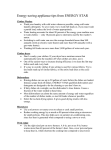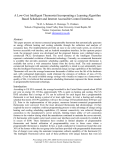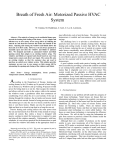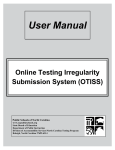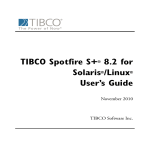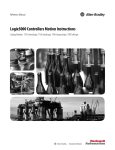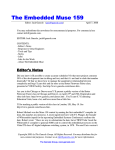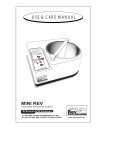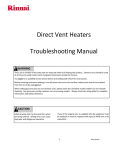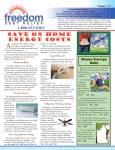Download 2012-04 April 2012 - Harrison Rural Electrification Association
Transcript
Harrison Rural Electrification Association, Inc. RR 6, Box 502 Clarksburg, WV 26301-0502 304-624-6365 www.harrisonrea.com HREA’s 75th Annual Meeting As you can see from the cover wrap on this magazine, it is time once again for our annual meeting. This one is significant because it marks our 75th anniversary of serving the membership. Very few businesses have been around as long as the cooperative and conquered the many obstacles we have faced on a daily basis. We can only imagine what the creators envisioned for the future of the cooperative. Back then getting electricity to their homes was truly a major improvement in their standard of living. Just think what it must have been like to get refrigeration, to get light without candles or kerosene, indoor plumbing and news from around the world. Today we may take all of that for granted, as our expectations have evolved far from what they were back then. Board of Directors C.B. Sharp, Dist. 1.....................President James Stuart, Dist. 4.........Vice President Darrell Powell, Dist. 6...........Secy.-Treas. Greg Robertson........Dist. 2 Kent Vance. .......Dist. 3 Ron Watson..............Dist. 5 Michael Cross ....Dist. 7 ________________ Terry Stout, General Manager Alan Cox ................Operations Manager Richard L. Fox..............Staking Engineer Scott Wyckoff ..............Staking Engineer Nada McNemar.............................Editor Office Hours 7:30 a.m. to 4 p.m., Mon.-Fri. When we get questioned about why we have an annual meeting of the membership, the easy answer most often given is “because it is required.” However, that answer doesn’t even begin to touch on the real reasons. The purpose of the meeting is to let you, the membership, know what the cooperative has accomplished and what we are planning for the future. The benefits of the meeting are getting to meet the membership face-to-face, to be able to put a face with the voice on the telephone and to hopefully gain a better understanding of each of our concerns. We celebrate 75 years of being here for each other and we honor those who have made it possible, but we also celebrate the future and what we hope it will bring. The road we travel may be different than the one that got us here, but it no doubt has its own curves, inclines and declines, potholes and treacherous intersections. By continuing to work together, we can navigate this road and hopefully make it possible for future generations to celebrate our history. The meeting will once again be at Liberty High School, and it will be held on April 19. If you don’t already know, Liberty is served by HREA. The doors to the cafeteria will open at 6 p.m. for registra- Manager’s Corner by Terry Stout, CEO/General Manager tion. This year’s meeting will once again begin with a meal provided by the Harrison County 4-H Exchange Club, with one slight twist. Because we saved budget dollars by not having to send out ballots, etc., this year and for our 75th anniversary, the menu will be based on baked steak rather than pasta. The 4-H group will begin serving at 6:15 p.m. At 6:30, live entertainment will begin in the school auditorium. This year’s entertainment is being provided by Mr. Braden Stover and Miss Jocelyn Stout. These two teenagers are part of our cooperative family and are directly and indirectly a part of my personal family. At 7:15 President C.B. Sharp will call the business meeting to order and after a few brief reports and discussion, Operations Manager Alan Cox will lead the prize drawing giveaway. We know everyone’s schedule is busy, but come and join us if you can. We only ask that you RSVP with the ladies in the office (304-624-6365) so that we can ensure we have enough food and drink. APRIL 2012 • COUNTRY LIVING 19 President’s Report C . B . S H A R P, P R E S I D E N T What a great time to be a part of Harrison Rural Electric Cooperative! This year, 2012, marks our 75th anniversary. Please allow me to share a few thoughts with you. Co-ops were originally formed because those of us who did not live on the main roads or on a road where there was a coal mine or a factory were out of luck getting investor-owned companies to provide electric service to our homes. Investor-owned companies were not interested in serving by “mom and pop” because C.B. Sharp there wasn’t enough profit for President them. In areas where there were no cooperatives, many families had to wait on the investor-owned utilities and did not get electric service until the 1950s. I spent many summers staying with my grandmother, who lived in Calhoun County, and she did not have electricity in her home until 1951. The government made it possible to form co-ops in 1936 by making available low-interest Rural Electrification Administration loans. I can just imagine our forefathers starting this cooperative in 1937. These people were not necessarily businessmen, but President’s Report were farmers, neighbors and friends who could see that electric power was a necessity, not a luxury. With their vision, they created a new time and a new beginning. With the flick of a switch, co-op members could chase away the darkness. They could stay up later and get up earlier, all the while being able to see. They could listen to the radio without a battery, and electric refrigeration was now available because of this new utility. Homemakers no longer had to wait for the iron to heat up on the stovetop; they simply plugged in their new electric iron making that chore a lot easier and faster. The early days were plagued with many outages that lasted for long periods of time. Members usually didn’t complain, however, because they were so grateful for the convenience of electricity. Over the years, there have been fewer power outages and reliability has increased. Our main goal has always been to deliver reliable, affordable electric power to all our members. For the future, we remain committed to this same goal as we strive to become an even better cooperative. Over the last year, we have accomplished much, but there is so much more to do, and the board, management and staff will continue to dedicate ourselves to providing you, our member/owners, with the best electric service possible. Operating and maintaining your heat pump Like all heating and cooling systems, proper maintenance remains the key to efficient heat pump operation. The difference in electric use between a well-maintained heat pump and a severely neglected one ranges from 10 to 25 percent! Remember not to set back a heat pump’s thermostat if it causes any backup heating system to kick on; they are usually more expensive to operate. Continuous indoor fan operation can also hurt heat pump performance unless you use a high-efficiency, variable-speed fan motor. Operate your heat pump with the “auto” fan setting on your thermostat. Clean or change filters once a month or as needed, and maintain the system according to manufacturer’s instructions. Dirty filters, coils and fans reduce airflow, which will decrease system performance and possibly damage the compressor. Clean outdoor coils whenever they appear dirty; occasionally, turn off power to the fan and clean it; remove vegetation and clutter from around the outdoor unit. Clean the supply and return registers within your home, and straighten their fins if bent. 20 COUNTRY LIVING • APRIL 2012 You should also have a professional technician service your heat pump at least every year. The technician should do the following: Inspect ducts, filters, blower and indoor coils for dirt and other obstructions; Diagnose and seal duct leakage; Verify adequate airflow by measurement; Verify correct refrigerant charge by measurement; Check for refrigerant leaks; Inspect electric terminals, and, if necessary, clean and tighten connections, and apply non-conductive coating; Lubricate motors and inspect belts for tightness and wear; Verify correct electric control, making sure that heating is locked out when the thermostat calls for cooling and vice versa; and Verify correct thermostat operation. To learn more about heat pumps, visit www.energysavers.gov. Harrison Rural Electrification Association, Inc. Annual meeting of the membership minutes The 2011 annual meeting of the membership began when the doors opened at 6 p.m. and a pasta dinner was provided to the membership. The dinner was prepared and served by the Harrison County 4-H Interstate Exchange Group. As members finished dinner, they gathered in the school auditorium and were entertained by Mr. Braden Stover and Miss Jocelyn Stout with a selection of country songs. Miss Stout then stepped forward and asked the attendees to observe a moment of silence in remembrance of Miss Allison Crosby a recently fallen member of the 4-H exchange group and the daughter of HREA members James and Carolyn Crosby. President Cross called the meeting to order at 7:15 p.m. and then called upon Mr. Sharp to give the invocation. President Cross led all in attendance in the Pledge of Allegiance and appointed Manager, Office Services, Terry Stout as recording secretary. President Cross then asked if there were any objections to using the meeting agenda as printed on page 2 of the annual report. There being no objections, President Cross introduced the current Board of Directors and all former Directors that were in attendance and retired employees. President Cross then turned the meeting over to Mr. Powell, secretary/treasurer. Mr. Powell presented the legal notice of the meeting, the proof of mailing of the official notice and he then read the official notice. Following the reading of the notice, Mr. Powell noted that the minutes of the meeting held on April 16, 2009, as well as the minutes from the meeting held April 15, 2010, were published in Country Living magazine and in the Annual Meeting Report distributed to the members in attendance. Mr. Powell explained that the 2009 minutes needed to be approved due to their not being a quorum at the 2010 annual meeting. Mr. Powell called for a motion to dispense with the reading of the meeting minutes and a motion was duly made, seconded and approved. A motion was made from the floor to approve the minutes as presented and the motion passed. Mr. Powell then gave his treasurer’s report where he highlighted the financial results from 2010. CEO/General Manager Gary Jackson then took the floor and covered various subjects relating to the operations of the cooperative. These subjects included topics on the PSC mandate to begin the delivery of electricity from renewable sources starting in 2015 to claims by political candidates that they would ensure that utility rates were rolled back. Mr. Jackson then answered questions from the membership. President Cross then introduced Ms. Brenda Swiger, chairwoman of HREA’s Credentials and Election Committee. Ms. Swiger reported that the committee had counted and reviewed all ballots returned and that all items on the ballot have passed. She also reported that Director Stuart ran unopposed as the incumbent for the District 4 seat and that Mr. Kent Vance ran unopposed for the District 3 seat formerly held by Mr. Glenn Cox who retired. Mr. Jackson then presented Mr. Cox with a plague honoring his tenure and service to the cooperative. Mr. Jackson then asked Mr. Alan Cox to conduct the prize drawing for door prizes. Mr. Cox stated that the first name selected would receive a $100 energy credit, then all door prizes would be awarded, then the final name would be selected for another $100 energy credit. Secretary Certification: Darrell Powell, Secretary/Treasurer APRIL 2012 • COUNTRY LIVING 21 Secretary/Treasurer’s Report BY DA R R E L L P O W E L L , S E C R E TA R Y / T R E A S U R E R The 2011 operating year marked the third consecutive year whereby the cooperative operated on a cashflow basis. Loan covenants dictate that the cooperative maintain minimum financial ratios including times interest earned (TIER), assets as a percentage of equity (Equity) and modified debt service coverage (MDSC) for the life of the loans. For the year your cooperative noted the following financial results: Operating revenue increased by approximately $567,000. This increase resulted from increased kilowatt-hour sales from new members. Power cost increased by approximately $350,000. This increase resulted from the increased sales and increases in transmission costs. Our current power con- tract is effective until May 2015. Total expenses, not including power cost, increased by approximately $419,000. This increase resulted from an increase in depreciation expenses and a change in accounting methodology in recognizing vacation and holiday time. Total long-term debt decreased by approximately $280,000. The membership’s equity grew to approximately 35.8 percent of the total electric plant. In addition, we paid off all of our $400,000 in short-term debt. A copy of the audited financial reports is included in the annual report and on the Country Living cover wrap. If you would like to see and review the complete audit report, you may visit our Charles Pointe office. Thank you. Energy-saving appliance tips from ENERGY STAR Clothes Washer Wash your laundry with cold water whenever possible, using cold water laundry detergents. To save water, try to wash full loads or, if you must wash a partial load, reduce the level of water appropriately. Water heating accounts for about 90 percent of the energy your machine uses to wash clothes — only 10 percent goes to electricity used by the washer’s motor. Switching to cold water can save the average household more than $40 annually (with an electric water heater) and more than $30 annually (with a gas water heater). Washing full loads can save more than 3,400 gallons of water each year. Clothes dryer Don’t overdry your clothes. If your dryer has a moisture sensor that automatically turns the machine off when clothes are done, use it. One of the easiest ways to increase drying efficiency is to clean the lint trap before each and every load. It’s easy to overdry clothes if one setting is used for various fabrics. Try to dry loads made up of similar fabrics so the entire load dries as the cycle ends. Dishwashers Rinsing dishes can use up to 20 gallons of water before the dishes are loaded. Instead, scrape food off dishes. ENERGY STAR-qualified dishwashers and detergents are designed to do the cleaning so you don’t have to. If dirty dishes sit overnight, use the dishwasher’s rinse feature. It uses a fraction of the water needed to hand rinse. Most dishwashers use about the same amount of energy and water regardless of the number of dishes inside, 22 COUNTRY LIVING • APRIL 2012 so run full loads whenever possible. Select the no-heat drying option. It gives good drying results with less energy. Microwave Use a microwave or toaster oven to reheat or cook small portions. Reduce cooking energy by as much as 80 percent when using a microwave for small portions. This also helps save on summer air-conditioning costs, since less heat is generated when compared to using a stove or oven. Oven range Use the right-sized pot on stove burners. A 6-in. pot on an 8-in. burner wastes more than 40 percent of the burner’s heat. Also, cover pots and pans to keep heat in. Using the right sized pot on stove burners can save about $36 annually for an electric range, or $18 for gas. Refrigerators Keep your refrigerator at 35 to 38 degrees Fahrenheit. Place the fridge in a cool place away from a heat source such as an oven, a dishwasher or direct sunlight. Allow air circulation behind the fridge. Keep the condenser coils clean if it’s an older model. Read the user’s manual to learn how to safely clean coils. Coil cleaning brushes can be purchased at most hardware stores. Make sure seals around the door are airtight. If not, replace them. Minimize the amount of time the refrigerator door stays open. Source: ENERGY STAR





